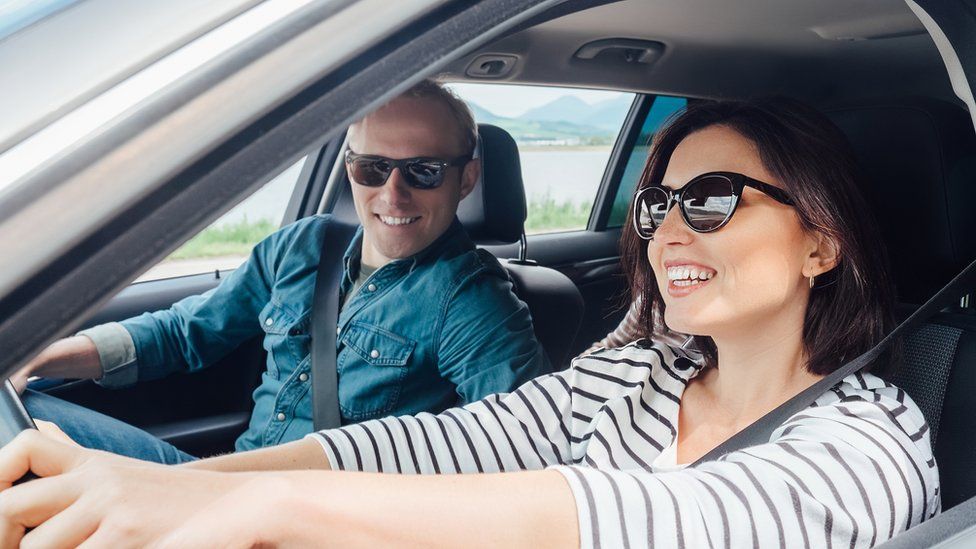Could your smartphone also save your family's life?
- Published

You've just had a terrible car crash. How quickly the emergency services arrive could determine whether you - or the people you're with - live or die.
Every second counts.
If you're in a built-up area with lots of witnesses, people are likely to call for help straight away. But what if you're on a lonely road somewhere remote? And what if you're unconscious?
It's a scenario none of us would willingly contemplate, but technology developed in South Africa aims to address it, reporting an emergency situation without even requiring a button to be clicked.
CrashDetech's app automatically monitors your trips using its "smart drive-detection" functionality. It is able to detect a serious car crash simply by using the accelerometer sensors in your phone that measure the g-force of an impact.
The app then pinpoints the driver's location and dispatches the nearest ambulance - complete with paramedics that know the user's medical history - automatically.
"Time is the driving factor in case of emergencies," says CrashDetech's chief executive, Jaco Gerrits, "and delays in receiving medical attention often turn out to be fatal.
"CrashDetech auto-detects a serious car crash and immediately gets help, turning your phone into a lifesaving device."
Of course it does depend on whether you're in an area with a sufficiently strong mobile phone signal or wi-fi.
There are telematics boxes hardwired into cars that can do the same thing, and the European Union is planning to introduce such "eCall" technology into all new cars by April 2018.
But the widespread adoption of smartphones is allowing tech firms around the world to offer app-based emergency alert services.
For example, Chilean app SOSmart sends an alert to your chosen list of emergency contacts if it detects that you've been in an accident.
Dangerous roads
According to the United Nations (UN) 1.3 million people die on roads across the world every year, while up to 50 million people are injured.
The danger is even greater in developing countries, where 90% of casualties occur, while annual road traffic deaths are forecast to rise to 1.9 million per year by 2020.
Mauritz Venter, an analyst at research company Frost & Sullivan, says such mobile safety apps are growing fast in popularity and will be most beneficial in countries such as India and South Africa, where crime and road safety are a priority.
"It is equally important, however, that relevant resources are available to ensure the efficient functioning of these safety solutions," he says.
"For example, mobile connectivity as well as professional emergency services that are capable of responding quickly to emergency scenarios, reported through the mobile application."
In other words, if you crash in the wilderness where there's no mobile signal or well-stocked, responsive ambulance services, such apps aren't much use.
But despite their limitations in countries with poor mobile connectivity and underfunded health systems, Mr Venter believes insurance companies are likely to begin incorporating such apps into their products.
"The ability to detect the need for immediate emergency service in real time significantly improves response times and, when combined with sophisticated data analytics, will enable predictive functionality as well," he says.
Personal safety
Smartphone alert systems are also being used for personal security as well.
For example, in India, One Touch Response (OTR) enables users to issue distress alerts that are picked up by incident managers at the company's control centre.
On-the-ground "immediate assistance teams" snap into action - OTR says they can reach the subscriber within minutes - while the company also liaises with emergency services depending on the type of incident.
"Given the ever-growing rate of crime, road accidents and medical emergencies in our cities, having a fast and professional response mechanism is the need of the hour," says Manoj Chandra, OTR's chief executive.
"We noticed that reliance on only the State Response Agencies is not sufficient because there are multiple numbers for different kind of emergencies. We cannot expect a person to remember so many numbers in the middle of an emergency."
OTR's one-point contact system - available through paid subscription on Android, iOS, and Windows devices - is similar to the 911 emergency number in the US, says Mr Chandra.
Where in the world?
As well as a "Help Me" button, the OTR app offers a "Track Me" service that allows users' friends and family to track their progress while travelling, and be aware if they have become unusually detained, for example.
It is a concept that has taken off worldwide, with the likes of bSafe in the US and Malaysia's WatchOverMe also building a strong following.
But Mr Chandra believes it has particular relevance in India, where there have been a number of high-profile incidents of violence against women, and feels OTR has an edge due to having its own response team.
"The state agencies are already stretched due to the sheer number of calls that they get. Moreover, not all situations are considered emergencies by state agencies.
"Many safety apps were introduced in the market but without dedicated response teams, hence they were of not much use," he says.
OTR says it has signed up 50,000 families so far and a growing number of businesses.
"Family safety is the biggest concern of the working class these days," says Mr Chandra. "But we give our subscribers a reason to feel safe at all times and have a peace of mind."
Follow Technology of Business editor @matthew_wall on Twitter